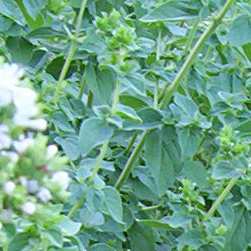
Greek Oregano
Origanum Vulgare subsp hirtum
O. heracleoticum, Wild Marjoram
Uses: C
Parts Used: F, L
Culinary: Heavy oregano aroma, dominating flavor, use sparingly. Use with zucchini, potatoes, eggplant, shellfish, black beans, muxhrooms, roasted & stewed beef, pork, poultry & game. Use in herb bread, marinated vegetables, pizza & Italian cooking. Use with majoram & basil to flavor cheese, tomato, bean & egg dishes. Edible flowers: use as you would the herb.
Medicinal: In tea for indigestion.
Disclaimer: Rams Hill Farm only includes Medicinal & Cosmetic use as a reference. Rams Hill Farm does not claim any medical knowledge. Readers should consult their physician before using any herbs for medicinal purposes. They should research these herbs on their own for risks, dosages, concerns, etc., particularly if these are intended for any medicinal treatments.
Drying Herbs: Hang in warm, dark, well-ventilated area until herbs are crisp(about 2 weeks). Store in a cool, dark area away from heat. Crumble herbs only as needed to retain the best possible flavor. A screen may also be used to dry any leaves not on a stem. Alternatively, herbs may be left in the fridge for several weeks to dry, this helps to retain the best color and flavor. Microwaving may cause the herbs to loose flavor from the high heat.
Uses abbreviations: Culinary; COsmetic; CRaft; Household; Medicinal; Ornamental; Fragrance; Economic; everLasting; Dye plant; Butterfly, bird, bee plant; Native
Parts Used abbreviations: Bark, Flowers, FRuit, Leaves, Roots, Seeds
| References: | ||
| Herbs | Geoffrey Burnie, Consultant Editor | Fog City Press |
| Herb Bible | McHoy, Peter & Pamela Westland | |
| Kitchen Garden Planner | Trout, Darrel | Country Home Books |
| Potpourri Gardener | James, Theodore, Jr | Macmillian Publishing |
| Herb Society of America | ||
| Mountain Meadow Seeds | ||
| There may be others |

